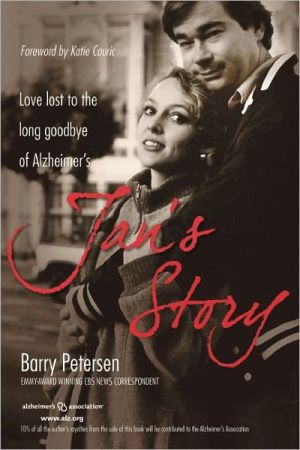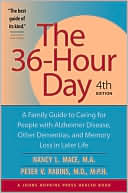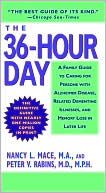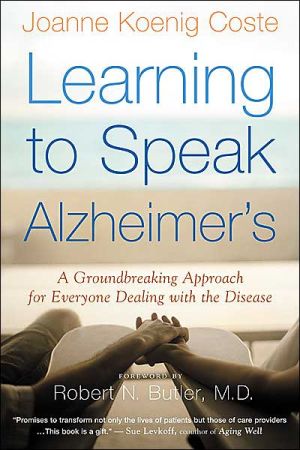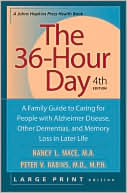The Forgetting: Alzheimer's: Portrait of an Epidemic
An urgent and moving exploration of the Alzheimer’s epidemic, The Forgetting is a dazzling meditation on the nature of memory and self and on the disease that robs people of both.
Search in google:
An urgent and moving exploration of the Alzheimer's epidemic, The Forgetting is a dazzling meditation on the nature of memory and self and on the disease that robs people of both. Alzheimer's disease is a demographic time bomb. Book Magazine According to Shenk, Alzheimer's disease is reaching epidemic proportions and could affect as many as 15 million Americans by the year 2050. Over the next fifty years, some 80 to 100 million people worldwide may succumb to it. Shenk's compelling book traces the history of Alzheimer's from its first diagnosis in 1901, and it chronicles the latest scientific discoveries that may eventually lead to its cure. The author includes the stories of not only Alzheimer's patients but also the families and caregivers whose lives have been affected, sometimes devastated, by it. Along the way, Shenk mentions a number of famous figures, including Ralph Waldo Emerson and Ronald Reagan, who have been victimized by the debilitating affliction. But The Forgetting is more than a record of Alzheimer's; it is an interesting study of how scientists are feverishly working and sometimes battling one another to find a cure. Mike Shea
Chapter 1\ I Have Lost Myself\ A healthy, mature human brain is roughly the size and shape of two adult fists, closed and pressed together at the knuckles. Weighing three pounds, it consists mainly of about a hundred billion nerve cells—neurons—linked to one another in about one hundred trillion separate pathways. It is by far the most complicated system known to exist in nature or civilization, a control center for the coordination of breathing, swallowing, pressure, pain, fear, arousal, sensory perception, muscular movement, abstract thought, identity, mood, and a varied suite of memories in a symphony that is partly predetermined and partly adaptable on the fly. The brain is so ridiculously complex, in fact, that in considering it in any depth one can only reasonably wonder why it works so well so much of the time.\ Mostly, we don't think about it at all. We simply take this nearly silent, ludicrously powerful electrochemical engine for granted. We feed it, try not to smash it too hard against walls or windshields, and let it work its magic for us.\ Only when it begins to fail in some way, only then are we surprised, devastated, and in awe.\ On November 25, 1901, a fifty-one-year-old woman with no personal or family history of mental illness was admitted to a psychiatric hospital in Frankfurt, Germany, by her husband, who could no longer ignore or hide quirks and lapses that had overtaken her in recent months. First there were unexplainable bursts of anger, and then a strange series of memory problems. She became increasingly unable to locate things in her own home and began to make surprising mistakes in the kitchen. By the time she arrived at Stadtische Irrenanstalt, the Frankfurt Hospital for the Mentally Ill and Epileptics, her condition was as severe as it was curious. The attending doctor, senior physician Alois Alzheimer, began the new file with these notes in the old German Sutterlin script.\ She sits on the bed with a helpless expression.\ "What is your name?"\ Auguste.\ "Last name?"\ Auguste.\ "What is your husband's name?"\ Auguste, I think.\ "How long have you been here?"\ (She seems to be trying to remember.)\ Three weeks.\ It was her second day in the hospital. Dr. Alzheimer, a thirty-seven-year-old neuropathologist and clinician from the small Bavarian village of Markbreit-am-Main, observed in his new patient a remarkable cluster of symptoms: severe disorientation, reduced comprehension, aphasia (language impairment), paranoia, hallucinations, and a short term memory so incapacitated that when he spoke her full-name, Frau Auguste D———, and asked her to write it down, the patient got only as far as "Frau" before needing the doctor to repeat the rest.\ He spoke her name again. She wrote "Augu" and again stopped.\ When Alzheimer prompted her a third time, she was able to write her entire first name and the initial "D" before finally giving up, telling the doctor, "I have lost myself."\ Her condition did not improve. It became apparent that there was nothing that anyone at this or any other hospital could do for Frau D. except to insure her safety and try to keep her as clean and comfortable as possible for the rest of her days. Over the next four and a half years, she became increasingly disoriented, delusional, and incoherent. She was often hostile.\ "Her gestures showed a complete helplessness," Alzheimer later noted in a published report. "She was disoriented as to time and place. From time to time she would state that she did not understand anything, that she felt confused and totally lost. Sometimes she considered the coming of the doctor as an official visit and apologized for not having finished her work, but other times she would start to yell out of the fear that the doctor wanted to operate on her [or] damage her woman's honor. From time to time she was completely delirious, dragging her blankets and sheets to and fro, calling for her husband and daughter, and seeming to have auditory hallucinations. Often she would scream for hours and hours in a horrible voice."\ By November 1904, three and a half years into her illness, Auguste D. was bedridden, incontinent, and largely immobile. Occasionally, she busied herself with her bed clothes. Notes from October 1905 indicate that she had become permanently curled up in a fetal position, with her knees drawn up to her chest, muttering but unable to speak, and requiring assistance to be fed.\ What was this strange disease that would take an otherwise healthy middle-aged woman and slowly—very slowly, as measured against most disease models—peel away, layer by layer, her ability to remember, to communicate her thoughts and finally to understand the world around her? What most struck Alzheimer, an experienced diagnostician, was that this condition could not fit neatly into any of the standard psychiatric boxes. The symptoms of Auguste D. did not present themselves as a case of acute delirium or the consequence of a stroke; both would have come on more suddenly. Nor was this the general paresis—mood changes, hyperactive reflexes, hallucinations—that can set in during the late stages of syphilis. She was clearly not a victim of dementia praecox (what we now call schizophrenia), or Parkinson's palsy, or Friedreich's ataxia, or Huntington's disease, or Korsakoff's syndrome, or any of the other well-recognized neurological disorders of the day, disorders that Alzheimer routinely treated in his ward. One of the fundamental elements of diagnostic medicine has always been the exercise of exclusion, to systematically rule out whatever can be ruled out and then see what possibilities are left standing. But Alzheimer had nothing left.\ What the fifty-one-year-old Auguste D.'s condition did strongly evoke was a well-known ailment among the elderly: a sharp unraveling of memory and mind that had, for more than five thousand years, been accepted by doctors and philosophers as a routine consequence of aging.\ History is stacked with colorful, poignant accounts of the elderly behaving in strange ways before they die, losing connection with their memories and the world around them, making rash decisions, acting with the impetuousness and irresponsibility of children. Plato insisted that those suffering from "the influence of extreme old age" should be excused from the commission of the crimes of sacrilege, treachery, and treason. Cicero lamented the folly of "frivolous" old men. Homer, Aristotle, Maimonides, Chaucer, Thackeray, Boswell, Pope, and Swift all wrote of a distressing feebleness of mind that infected those of advancing years.\ "Old age," wrote Roger Bacon, "is the home of forgetfulness."\ Known as morosis in Greek, oblivio and dementia in Latin, dotage in Middle English, d*mence in French, and fatuity in eighteenth-century English, the condition was definitively termed senile dementia in 1838 by the French psychiatrist Jean ftienne Esquirol. In a depiction any doctor or caregiver would recognize today, Esquirol wrote: "Senile dementia is established slowly. It commences with enfeeblement of memory, particularly the memory of recent impressions."\ But that was senile dementia. What was this? Alois Alzheimer wanted to know. Why did a fifty-one-year-old appear to be going senile? How could Auguste D. be suffering from the influence of extreme old age?\ We are the sum of our memories. Everything we know, everything we perceive, every movement we make is shaped by them. "The truth is," Friedrich Nietzsche wrote, "that, in the process by which the human being, in thinking, reflecting, comparing, separating, and combining . . . inside that surrounding misty cloud a bright gleaming beam of light arises, only then, through the power of using the past for living and making history out of what has happened, does a person first become a person."\ The Austrian psychiatrist Viktor Frankl made much the same point in Man's Search for Meaning, his memoir of experiences as a concentration camp inmate. Frankl recalled trying to lift the spirits of his fellow camp inmates on an especially awful day in Dachau: "I did not only talk of the future and the veil which was drawn over it. I also mentioned the past; all its joys, and how its light shone even in the present darkness. [I quoted] a poet . . . who had written, Was Du erlebst, kann keine Macht der Welt Dir rauben. (What you have experienced, no power on earth can take from you). Not only our experiences, but all we have done, whatever great thoughts we may have had and all we have suffered, all this is not lost, though it is past; we have brought it into being. Having been is a kind of being, and perhaps the surest kind."\ Emerson was also fascinated by memory—how it worked, why it failed, the ways it shaped human consciousness. Memory, he offered about a decade or so before his own troubles first appeared, is "the cement, the bitumen, the matrix in which the other faculties are embedded . . . without it all life and thought were an unrelated succession." While he constructed an elaborate external memory system in topical notebooks, filling thousands of pages of facts and observations that were intricately cross-referenced and indexed, Emerson was also known for his own keen internal memory. He could recite by heart all of Milton's "Lycidas" and much of Wordsworth, and made it a regular practice to recite poetry to his children on their walks. His journal entries depict an enchantment with the memory feats of others.\ He kept a list:\ Frederic the Great knew every bottle in his cellar. Magliabecchi wrote off his book from memory. Seneca could say 2,000 words in one hearing. L. Scipio knew the name of every man in Rome. Judge Parsons knew all his dockets next year. Themistocles knew the names of all the Athenians.\ "We estimate a man by how much he remembers," Emerson wrote.\ Ronald Reagan was never particularly admired for his memory. But in the late 1980s and early '90s, he slowly began to lose his grasp on ordinary function. In 1992, three years after leaving the White House, Reagan's forgetting became impossible to ignore. He was eighty-one.\ Both his mother and older brother had experienced senility, and he had demonstrated a mild forgetfulness in the late years of his presidency. Like many people who eventually suffer from the disease, Reagan may have had an inkling for some time of what was to come. In his stable of disarming jokes were several about memory troubles afflicting the elderly. He shared one at a 1985 dinner honoring Senator Russell Long.\ An elderly couple was getting ready for bed one night, Reagan told the crowd. The wife turned to her husband and said, "I'm just so hungry for ice cream and there isn't any in the house."\ "I'll get you some," her husband offered.\ "You're a dear," she said. "Vanilla with chocolate sauce. Write it down—you'll forget."\ "I won't forget," he said.\ "With whipped cream on top."\ "Vanilla with chocolate sauce and whipped cream on top," he repeated.\ "And a cherry," she said.\ "And a cherry on top."\ "Please write it down," she said. "I know you'll forget."\ "I won't forget," he insisted. "Vanilla with chocolate sauce, whipped cream, and a cherry on top."\ The husband went off and returned after a while with a paper bag, which he handed to his wife in bed. She opened up the bag, and pulled out a ham sandwich.\ "I told you to write it down," she said. "You forgot the mustard."\ It seems clear enough that Reagan was increasingly bothered by personal memory lapses. In a regular White House checkup late in his second term, the President began by joking to his doctor, "I have three things that I want to tell you today. The first is that I seem to be having a little problem with my memory. I cannot remember the other two."\ Did Reagan have Alzheimer's disease in office? Yes and no. Without a doubt, he was on his way to getting the disease, which develops over many years. But it is equally clear that there was not yet nearly enough decline in function to support even a tentative diagnosis. Reagan's mind was well within the realm of normal functioning. Even if his doctors had been looking intently for Alzheimer's, it is still likely that they would not have been able to detect the disease-in-progress. A slight deterioration of memory is so common among the elderly that even today it is considered to be a natural (if unwelcome) consequence of aging. About a third to a half of all human beings experience some mild decline in memory as they get older, taking longer to learn directions, for example, or having some difficulty recalling names or numbers.\ Alzheimer's disease overtakes a person very gradually, and for a while can be indistinguishable from such mild memory loss. But eventually the forgetting reaches the stage where it is quite distinct from an absentminded loss of one's glasses or keys. Fleeting moments of almost total confusion seize a person who is otherwise entirely healthy and lucid. Suddenly, on a routine drive home from work, an intersection he has seen a thousand times is now totally unfamiliar. Or he is asking about when his son is coming back from his European vacation, and his wife says: "What do you mean? We both spoke to him last night." Or he is paying the check after a perfectly pleasant night out and it's the strangest thing, but he just cannot calculate the 20 percent tip.\ The first few slips get chalked up to anxiety or a lousy night's sleep or a bad cold. But how to consider these incidents of disorientation and confusion when they begin to occur with some frequency? What begin as isolated incidents start to mount and soon become impossible to ignore. In fact, they are not incidents; collectively, they are signs of a degenerative condition. Your brain is under attack. Months and years go by. Now you are losing your balance. Now you can no longer make sense of an analog clock. Now you cannot find the words to complain about your food. Now your handsome young husband has disappeared and a strange elderly man has taken his place. Why is someone taking your clothes off and pouring warm water over you? How long have you been lying in this strange bed?\ By 1992, the signs of Reagan's illness were impossible to ignore. At the conclusion of a medical exam in September, as the New York Times would later report, Reagan looked up at his doctor of many years with an utterly blank face and said, "What am I supposed to do next?" This time, the doctor knew that something was very wrong.\ Sixteen months later, in February 1994, Reagan flew back to Washington, D.C., from his retirement home in Bel Air, California, for what would turn out to be his final visit. The occasion was a dinner celebrating his own eighty-third birthday, attended by Margaret Thatcher and twenty-five hundred other friends and supporters.
Prologue1Pt. IEarly Stage1I Have Lost Myself112Bothered283The God Who Forgot and the Man Who Could Not444The Race625Irrespective of Age726A Most Loving Brother86Pt. IIMiddle Stage7Fumbling for the Name of My Wife1018Back to Birth1129National Institute of Alzheimer's13210Ten Thousand Feet, at Ten O'Clock at Night14811A World of Struldbruggs16212Humanize the Mouse17813We Hope to Radio Back to Earth Images of Beauty Never Seen192Pt. IIIEnd Stage14Breakthrough?20915One Thousand Subtractions21616Things to Avoid22817The Mice Are Smarter242Epilogue253Acknowledgments257Resources for Patients and Families261Sources265Index281
\ From Barnes & NobleThe Barnes & Noble Review\ Scientists estimate that by the year 2050, Alzheimer's disease will afflict about 15 million Americans. Considering the severe mental debilitation wrought by Alzheimer's, the effects on both the families of patients and the health care system as a whole could be substantial. In this context, David Shenk's The Forgetting is a significant contribution to the public discussion of Alzheimer's. A synthesis of scientific information and personal stories, the book traces the known origins of the disease -- which was once thought to be a natural symptom of aging -- and offers a provocative look at the medical community's quest to cure it. \ Made up of "plaques" and "tangles" that appear on the cerebral cortex and destroy neurons (and, with them, memory), Alzheimer's was first detected in a patient named Auguste D. at a psychiatric hospital in Frankfurt, Germany, in 1901. At the time, Auguste D.'s condition was an anomaly to neuropathologist and physician Alois Alzheimer because at age 51, the patient seemed to be free of any psychiatric condition but, rather, appeared to be suffering from the severe effects of old age. It was this experience that led Dr. Alzheimer to undertake research that eventually uncovered the disease.\ Certainly, Alzheimer's existed long before it was assigned a name. Shenk cites historical figures and literary allusions -- found in the work of, among others, Shakespeare and Tolstoy -- that attest to the existence of Alzheimer's as far back as the first century A.D. The book cites a likely case of Alzheimer's in Ralph Waldo Emerson and confirmed cases in Willem de Kooning, Ronald Reagan, and Rita Hayworth. But equally affecting as these tragic examples of extinguished public careers are the cases of "normal" people slowly losing their recollection of the fabric of their lives. Quotes from such people begin each chapter, grounding all the scientific and historical information in the reality and horror of the human experience of Alzheimer's.\ This is not a guidebook to treating or coping with Alzheimer's disease; readers seeking such practical advice will find ample guidance elsewhere. Rather, The Forgetting conveys the urgency and the heartbreak surrounding the disease and challenges the way we conceive of memory. It will indeed provide a measure of comfort to anyone grappling with the devastating effects of Alzheimer's, and yet it provides more than that, revealing much about a condition that has been shrouded in darkness for so long and simultaneously exposing how much remains to be discovered. (Karen Burns)\ \ \ \ \ \ According to Shenk, Alzheimer's disease is reaching epidemic proportions and could affect as many as 15 million Americans by the year 2050. Over the next fifty years, some 80 to 100 million people worldwide may succumb to it. Shenk's compelling book traces the history of Alzheimer's from its first diagnosis in 1901, and it chronicles the latest scientific discoveries that may eventually lead to its cure. The author includes the stories of not only Alzheimer's patients but also the families and caregivers whose lives have been affected, sometimes devastated, by it. Along the way, Shenk mentions a number of famous figures, including Ralph Waldo Emerson and Ronald Reagan, who have been victimized by the debilitating affliction. But The Forgetting is more than a record of Alzheimer's; it is an interesting study of how scientists are feverishly working—and sometimes battling one another—to find a cure. \ —Mike Shea \ \ \ \ \ Library JournalThe price humans pay for increased longevity is a greater likelihood of developing degenerative diseases. Among the most devastating is Alzheimer's, predicted to reach epidemic proportions by midcentury. Journalist Shenk's "biography" of Alzheimer's disease explores the nature of the baffling plaques and tangles, discovered by Alois Alzheimer in 1907, that eventually consume the brains of victims, erasing a lifetime of memories. Notable sufferers whose stories Shenk tells here include Ronald Regan, Ralph Waldo Emerson, and Willem de Kooning; there are also personal accounts from the less famous he met in Internet chatrooms. Shenk also chronicles tales of driven researchers, hellbent to be the first to unlock the disease's secrets and the riches to be made by drug manufacturers hungry for a moneymaking cure. His engrossing book draws on an amazing array of scientific, historical, ethical, religious, mythological, literary, and artistic sources and is filled with fascinating characters and first-rate explanations of the science behind the disease. (His technical discussion of memory and other aspects of the disease is much clearer than Charles Pierce's in Hard To Forget, LJ 4/15/00.) A unique and welcome addition to any scientific, aging, or Alzheimer's collection. [Previewed in Prepub Alert, LJ 5/1/01.] Karen McNally Bensing, Benjamin Rose Inst. Lib., Cleveland Copyright 2001 Cahners Business Information.\ \ \ \ \ Kirkus ReviewsAn intelligent and helpful tour of Alzheimer's, by science writer Shenk (The End of Patience). Since ancient times, senility has been considered a natural result of aging. Although the etiology was never clear, by the mid-20th century some blamed hardening of the arteries. In fact, although normal aging produces a mild memory deficit (mostly difficulty finding names), dementia is never normal. The author begins with the 1901 case described by neurologist Alois Alzheimer, who first noticed peculiar plaques and tangles of fibers dotting brain tissue in his microscopic exam. Victims of Alzheimer's dementia begin by forgetting: Global brain function deteriorates (beginning with higher faculties such as judgment and personality) and eventually the patient becomes mute, bedridden, incontinent, and delirious. Alzheimer's research attracted little attention in his day, but as decades passed, more and more plaques and fibers turned up in brain autopsies and, by the 1970s, it became clear that Alzheimer's was not merely common, it was epidemic. Half a million Americans suffered in 1975; today the figure is closer to 5 million, making Alzheimer's far more common than AIDS. Like AIDS it's incurable; unlike AIDS no one knows how to prevent it. The author tells the story of famous historic victims (from Jonathan Swift to Ralph Waldo Emerson to Ronald Reagan) and describes how today's patients deal with the disease. He also travels to interviews and conferences, where he reports the scientific debates now taking place over cause and treatment. Like most laymen, Shenk believes that the dramatic progress in our understanding of Alzheimer's means that a good treatment is on the horizon, but nodramatic breakthrough seems imminent. Time alone will tell. The subject may be depressing, but it's also important, and the author holds the reader's interest to the end.\ \

